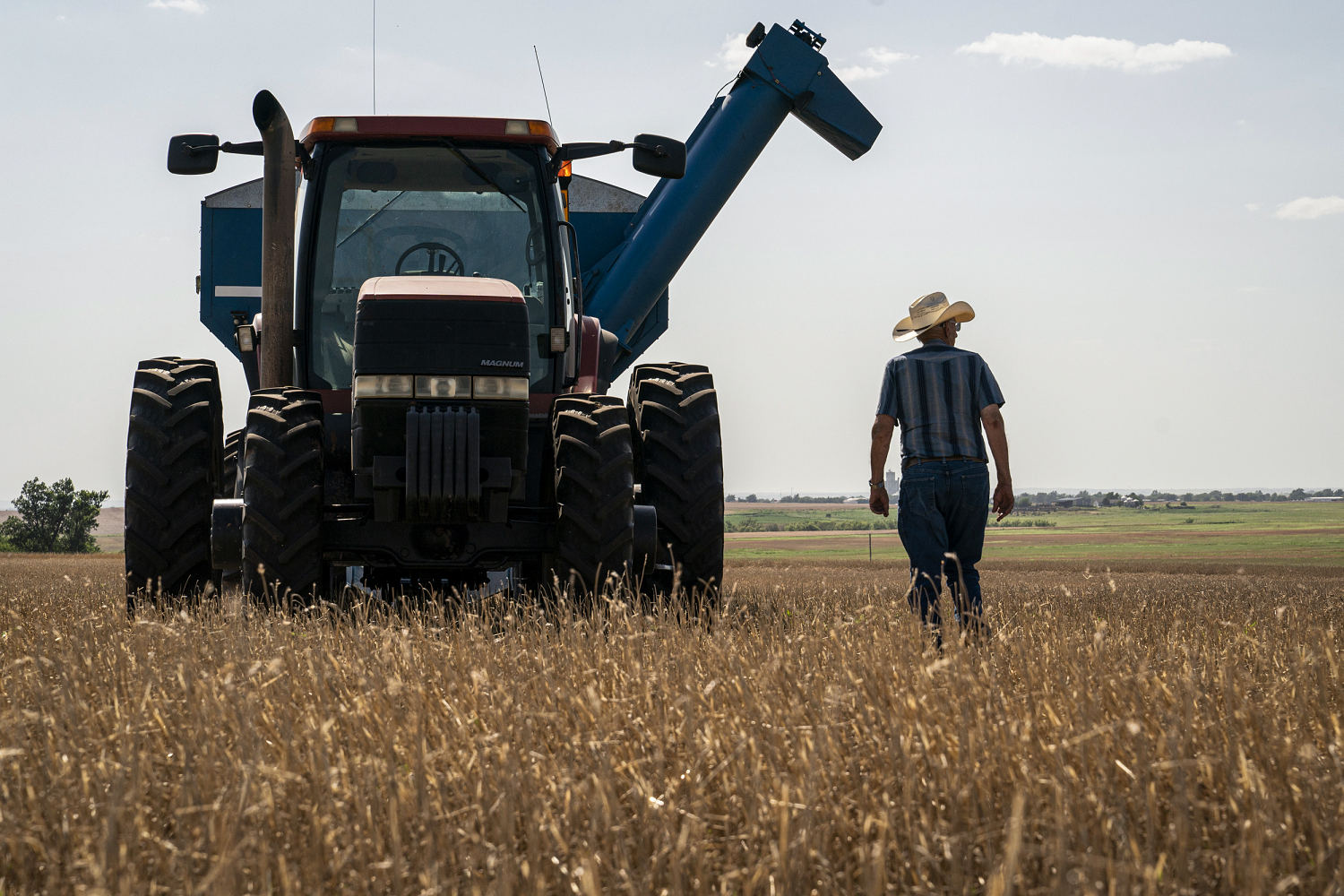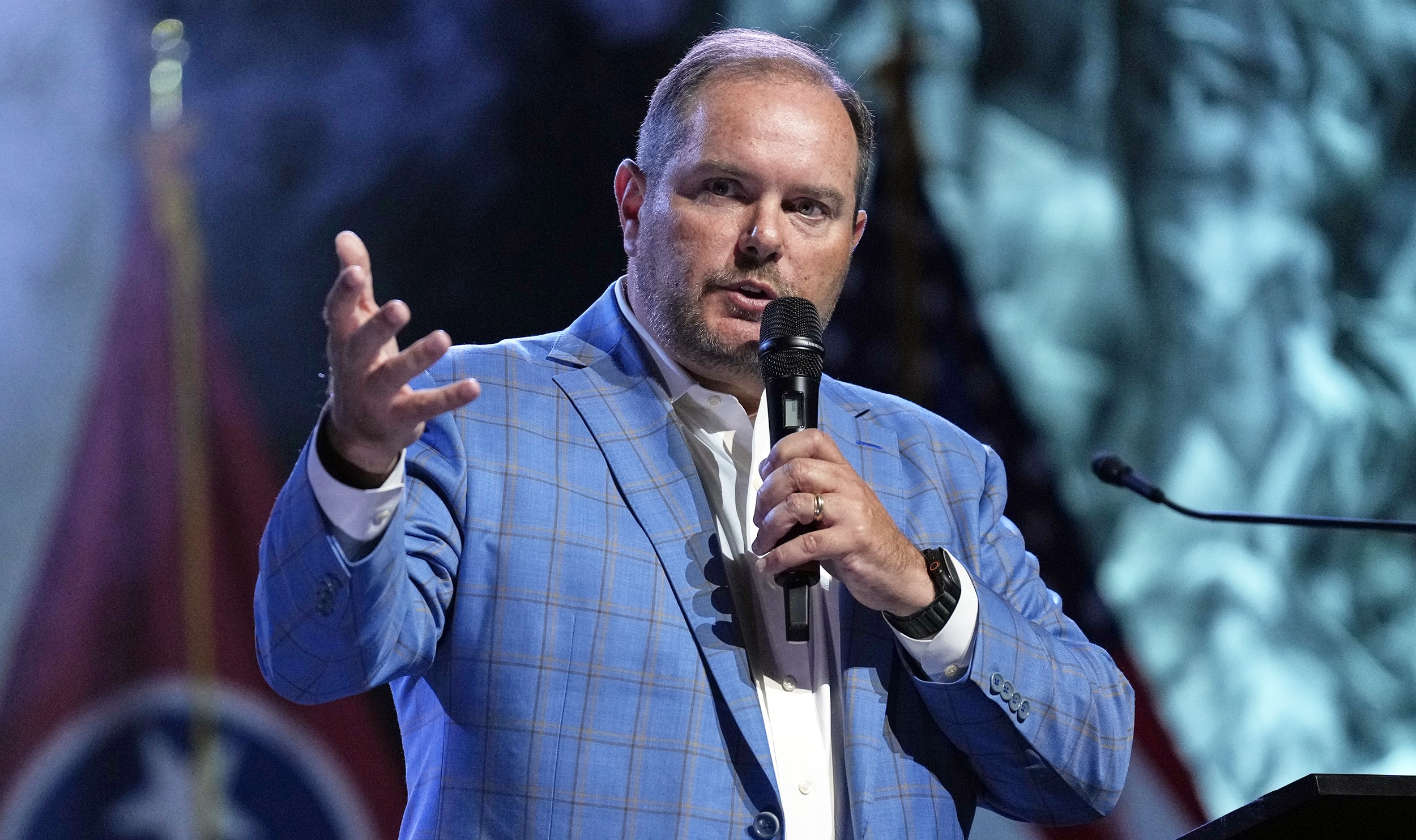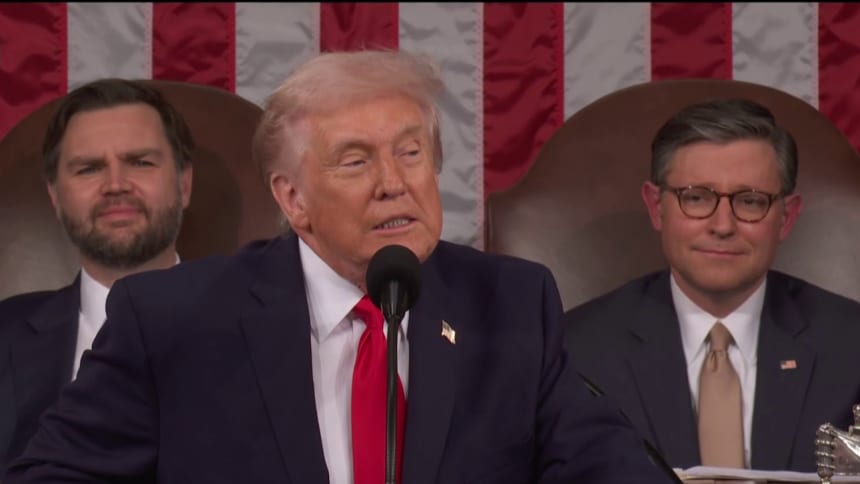The Dictatorship
I’m a sixth-generation farmer. Trump’s funding freeze is throwing my world into chaos.

The Trump administration’s decision to pause and review federal funding has sparked uncertainty for many Americans. Even if you have not personally felt the effects yet, you soon might, because these abrupt freezes are hitting family farmers and ranchers hard. And when farmers struggle, every consumer feels it at the grocery store.
Agriculture is a complex industry, often overlooked in national policy discussions. Farmers take on an immense amount of financial risk to put a crop into the ground or raise a herd of livestock, only to be wiped out by a natural disaster, rising costs or collapsing markets. The programs under review — or those completely frozen — help family farmers manage risk, access credit and stay afloat when times get tough.
Without intervention, these cuts will ripple through rural economies.
Like all businesses, farmers need some stability to succeed. As a sixth-generation farmer from West Virginia, I understand the administration’s desire to root out waste, fraud and abuse in federal programs. But the current freeze is creating chaos instead of reform. No one knows what funding will be available, or if key programs will have the staff needed to operate. Here are a few examples of the funding freeze’s real-world impacts on America’s farmers.
The freeze has most immediately impacted federal conservation and voluntary climate-smart agriculture projects. Across the country, farmers have been left in limbo after making sustainability investments, trusting that the government would uphold its commitments.
For example, some farmers who purchased cover crop seed to improve soil health or installed solar panels to reduce energy costs are now learning that federal reimbursements have been cut off. These are not theoretical losses. These are real financial burdens that could push family farms into bankruptcy. Without intervention, these cuts will ripple through rural economies. Every farm that goes out of business means fewer families in rural communities, less money spent at the local businesses, fewer kids in the local schools, and fewer tax dollars for roads, hospitals and emergency services.
Farmers and policymakers in both parties have broadly supported international food aid for decades. American farmers produce more food than we can consume, and food aid donations serve the dual purpose of providing a new market opportunity for farmers and feeding people in need around the world. The U.S. purchased roughly $2 billion in food aid last year from American farmers; dismantling our food aid program is certain to disrupt market prices and create additional stress for U.S. food producers.
Beyond agriculture, the funding freeze threatens the infrastructure that keeps rural communities running. Federal grants and loans help small towns replace aging and costly infrastructure, such as broadband and water systems, and invest in local meat and food processing. Local entities have relied on federal loans and loan guarantees — existing commitments that the government is now freezing, leaving farmers, investors, lenders and rural communities on the hook for funds already spent.
Shrinking the size of the federal workforce might seem like a reasonable way to cut costs, but in agriculture it could have disastrous consequences. Farmers rely on federal employees to administer disaster relief, risk management programs and conservation initiatives, and rural areas already struggle to recruit and retain qualified staff.
One of the more alarming impacts could be on U.S. Department of Agriculture food safety inspectors. Meatpacking plants cannot operate without them, meaning staffing shortages could slow or shut down processing facilities. This would hurt livestock growers, who already face limited options due to industry consolidation. It would also reduce meat supply, driving up prices for consumers. These funding freezes do not just hurt individual farmers. They reinforce a food system already dominated by a handful of powerful corporations. Over the past several decades, agriculture has become more concentrated, with a few companies controlling everything from seeds and fertilizers to meatpacking and grain trading. Farmers have few choices on where to sell their products, leaving them at the mercy of companies that keep farm prices low while raising costs for consumers.
Every farm that goes out of business means fewer families in rural communities, less money spent at the local businesses, fewer kids in the local schools, and fewer tax dollars for roads, hospitals, and emergency services.
Further instability in federal programs only strengthens these monopolies. When family farmers lose access to credit, conservation programs or technical assistance, they are more likely to be forced out of business or absorbed by corporate interests. That means less competition, fewer independent farmers and higher grocery prices for American families.
Finally, federal research funding drives breakthroughs in crop and animal science, safeguarding our food supply from emerging diseases and advancing technologies that help farmers produce more with fewer resources. However, the current funding freeze has stalled agricultural research, leaving farmers without the tools they need to adapt to a changing climate and evolving threats. Investing in agriculture is investing in the future — ensuring farmers can keep farming, rural communities can stay vibrant, and every American can have access to safe, affordable food.
Supporting family farmers and ranchers means supporting the backbone of our nation. These funding cuts are not just numbers on a budget spreadsheet; they represent real dollars that sustain families and power rural economies. Freezing spending and making sweeping decisions without congressional oversight just adds more uncertainty to a stressed farm economy. The right way to evaluate government programs is through thoughtful, measured approaches that protect taxpayer dollars without causing harm to family farmers, ranchers and rural communities.
Policymakers must listen to the voices of those most impacted and recognize the real-world consequences of any cuts. Our rural economy and food system — and therefore all of America — depends on it.
Rob Larew
Rob Larew is a leader in agriculture, public policy and rural advocacy. Larew leads the second-largest general farm organization as the 15th president of National Farmers Union, representing more than 230,000 family farmers and ranchers across the country. A sixth-generation farmer from West Virginia, Larew has dedicated his career to advancing the interests of family farmers and rural communities across the United States.
The Dictatorship
MAGA world’s violent pregnancy-related rhetoric is on full display

Conservatives’ crusade against reproductive freedom is deathly serious. Two controversies over the past week highlight some of the violence undergirding the MAGA movement’s assault on the idea of people choosing when and whether to bear children.
In Tennessee, two GOP state lawmakers are gauging interest in legislation that would make people eligible for homicide charges — and potentially the death penalty — for receiving or assisting with an abortion.
The bill’s co-sponsor in the state Senate said he doesn’t think the bill currently has the votes but ultimately could. Per the WSMV television station in Nashville:
“We want to be very open and have a conversation, whether it’s controversial or not — let’s hear from all sides to see where we are as Tennessee and where we stand,”[stateSenMark[stateSenMark] Pody said. “Talking to some colleagues, we don’t have the votes to move something like that in the Senate at this moment.”
Pody said he does not consider the bill dead on arrival in the Senate, adding he believes there is a possibility for negotiation and that Republicans in the House and Senate could reach an agreement on language that could pass both chambers.
Most Americans seem to think we shouldn’t kick the tires on state-sponsored executions for abortion recipients. Pody apparently disagrees.
His fellow co-sponsor in the House, state Rep. Jody Barrett, didn’t sound any more sane in his exchanges about the bill with reporter Chris Davis from WTVF, the CBS affiliate in Nashville.
“Murder should be murder, whether it’s a person in being or a person in utero,” Barrett said.
I asked Barrett directly about the criticism that the bill unfairly targets mothers.
“I think that’s a talking point saying that you’re targeting mothers. We’re not targeting mothers. We’re targeting unborn children and trying to protect them and give them the protection under the law for you and me,” Barrett said.
The tacit admission came later:
“A simple examination of the death penalty in Tennessee would show that that’s just not realistic. Now, do I have to admit that the death penalty is a possibility? Sure. But since the death penalty was reinstated in Tennessee in 1977, there’s been less than 200 people sentenced to death, and only 16 have actually been executed — none of them women,” Barrett said.
It’s safe to say the latter remarks are probably not going to be enough to soothe concerns about this morbid proposal — one that mirrors several others across the country in the past year.
In Vermont, a different controversy is unfolding over a right-wing influencer named Hank Poitras, who was elected chairman of a county GOP committee — and who once delivered an extremely graphic diatribe about committing an act of violence on a woman’s womb after she got pregnant.
Ja’han Jones is an MS NOW opinion blogger. He previously wrote The ReidOut Blog.
The Dictatorship
Trump administration pauses Medicaid funding to Minnesota

The Trump administration is temporarily halting $259 million in Medicaid funding to Minnesota, Vice President JD Vance announced Wednesday.
Vance said the payments will be paused “until the state government takes its obligations seriously to stop the fraud that’s being perpetrated against the American taxpayer.”
The news of the temporary halting of the massive amount of federal funding — which provides health insurance to low-income people — comes as the state has been a target of the federal government following allegations of fraud perpetrated by child care providers in the state. In December, federal officials froze $185 million in child care funds to Minnesota, and last month, the administration announced it was freezing $10 billion in funding for social services programs in five Democratic-led states, including Minnesota.
The latest news also follows President Donald Trump’s announcement at the State of the Union address Tuesday night that he was tasking the vice president with waging a “war on fraud.”
Dr. Mehmet Oz, administrator for the Centers for Medicare and Medicaid Services, said Wednesday that officials identified “scammers” who he claimed “hijacked … a certain part of the Minnesota Medicaid system.”
Federal prosecutors have confirmedthere was large-scale social services fraud in Minnesota, with dozensof people — many of whom are Somalis — having been convicted of stealing more than $1 billion in public funds intended for food, housing and services for people with disabilities. But the administration did not provide detailed evidence on Wednesday of the alleged large-scale Medicaid fraud in Minnesota that Oz claimed.
“These schemes disproportionately involve immigrant communities,” Oz said. Generally, undocumented people are not able to be enrolled in Medicaid.
Vance mentioned a program that he said claimed to offer after-school services to autistic children but did not actually do so, though he did not offer any identifying information.
Oz added that the top fraudulent biller in the state “submitted 450 days where they claim they were working more than 24 hours a day,” but also did not provide corroborating information.
According to the health policy research organization KFF, Medicaid covers nearly 1.2 millionkids and adults in Minnesota, more than half of whom are nursing home residents. More than three-quarters of Medicaid enrollees in the state are working full time, that data also shows.
Oz said the federal government will only release the funds “after they propose an act on a comprehensive corrective action plan to solve the problem,” adding that Gov. Tim Walz, D-Minn., has 60 days to do so. He suggested similar announcements to come in other states “soon,” and mentioned Florida, New York and California as potential future targets.
“This is not a problem with the people of Minnesota,” Oz said. “It’s a problem with the leadership of Minnesota and other states who do not take Medicaid preservation seriously.”
Vance added: “The main reason that we’re doing this is that we want to make sure that the people of Minnesota have access to the services that they’re entitled to.”
In a post on X on Wednesday night, Walz said the announcement “has nothing to do with fraud,” and added, “The agents Trump allegedly sent to investigate fraud are shooting protesters and arresting children. His DOJ is gutting the U.S. Attorney’s Office and crippling their ability to prosecute fraud. And every week, Trump pardons another fraudster.”
Minnesota lawmakers and the state’s attorney general, Keith Ellison, have introduced legislation that would add more than a dozen new staffers to the AG office’s Medicaid Fraud Control Unit and that would strengthen state fraud laws.
In a statement provided to MS NOW, Ellison hinted the state may sue in response.
“Courts have repeatedly found that their pattern of cutting first and asking questions later is illegal, and if the federal government is unlawfully withholding money meant for the 1.2 million low-income Minnesotans on Medicaid, we will see them in court,” he said.
Shireen Gandhi, commissioner of the Minnesota Department of Human Services, which administers Medicaid, said the government’s actions “significantly harm the state’s health care infrastructure and the 1.2 million Minnesotans who depend on Medicaid,” adding that federal officials “chose to ignore more than a year of serious and intensive work to fight fraud in our state.”
Spokespeople for Sen. Tina Smith, D-Minn., and Sen. Amy Klobuchar, D-Minn., did not immediately respond to MS NOW’s request for comment.
Nour Longi and Emily Hung contributed reporting.
Julianne McShane is a breaking news reporter for MS NOW who also covers the politics of abortion and reproductive rights. You can send her tips from a non-work device on Signal at jmcshane.19 or follow her on X or Bluesky.
The Dictatorship
Trump says he’s ‘won affordability.’ The data shows a different story.
ByJosh Bivens
President Donald Trump has said some strikingly out-of-touch things about affordability: that it’s a “hoax,” he’s “solved it” and he’s “won affordability.” In his State of the Union address, he even said “prices are plummeting downward.” U.S. families know this is nonsense. But to see how much Trump’s policies will erode affordability in the coming years, you must understand that affordability isn’t just about prices.
Affordability is the outcome of a race between incomes and prices. And for typical families, the Trump agenda is near-guaranteed to harm their incomes far more than it can possibly reduce their prices.
For typical families, the Trump agenda is near-guaranteed to harm their incomes far more than it can possibly reduce their prices.
Even judged by the movement of prices alone, Trump’s record on affordability is poor. Inflation fell from 8.0% to 3.0% in the final two years of the Biden administration. This rapid downward movement slowed to a crawl in the first year of Trump’s second term, with inflation falling from 3.0% to just over 2.6%.
There are clear policy reasons why progress in reducing inflation has slowed. Electricity prices have surged as the Trump administration has ended subsidies for renewable generation passed during the Biden administration. The Trump tax cuts passed in the president’s first term were part of a law that gouged loopholes in the tax code, including inviting pharmaceutical companies to offshore their production and import back into the United States. Last year the Trump administration put tariffs on these offshored pharmaceuticals, pushing up their costs. When the administration failed to extend Obamacare subsidies for people buying health insurance through the exchanges, healthier enrollees who could afford to began opting out, driving up prices for everybody left in the Affordable Care Act marketplace.
And these are not the only ways that Trump administration policies have intensified affordability issues for ordinary Americans.

That failure to extend Obamacare subsidies did more than lead to higher market prices for exchange insurance plans. It also siphoned income away from families that could have been used to defray the cost of buying health insurance. Instead, out-of-pocket burdens spiked. Even bigger harm looms for more vulnerable families as the Republican tax and spending megabill, known as Trump’s One Big Beautiful Bill Act, is poised to cut Medicaid and food stamps by more than $1 trillion over the next decade. These cuts effectively remove income from the pockets of the most vulnerable. This explains why the bill reduced affordability for the bottom 40% of families in this country.
It is hard to make a bunch of changes to the nation’s tax and spending laws that add $4 trillion to the nation’s debt and still somehow manage to make 40% of the population worse off. If you’re borrowing it all anyhow, why not at least give something to the worst-off among us?

Finally, even as inflation fell slightly in 2025, wage growth adjusted for inflation (or real wages) also slowed. For the lowest-wage workers, these real wages actually declined. The reason is simple: The labor market cooled in 2025. This was no accident. The administration’s federal workforce cuts, deportation agenda and the chaos of the Trump tariff policy and approach to the Federal Reserve all contributed to labor market sluggishness. And workers in the bottom half of the wage distribution need sustained and very low unemployment rates to gain any leverage with employers when they ask for higher wages. They had this leverage early in the post-pandemic recovery, but it’s been lost. The labor market would have cooled even faster in 2025 had there not been a ramp-up in spending associated with the frenzied buildout of artificial intelligence firms and the related stock market boom (which could still prove to be a bubble).
With all that in mind about the scale of Trump policies’ negative impact on affordability, now let’s consider what genuine wins in affordability would look like.
A chief place to start: attacks on the influence that has most harmed U.S. families’ affordability in recent decades — the rise in inequality that has funneled income away from the bottom and middle toward the top. This expansion in inequality was policy-generatedso it can be reversed by different policy choices. Yet the Trump administration has doubled down on strategies that have increased inequality by hamstringing workers’ rights to organize unions and bargain collectively and rolling back important labor standards, such as minimum wages. (If you want more examples, my Economic Policy Institute colleagues and I identified 47 ways Trump has made life less affordable for Americans over the past year.)
The first step in a good-faith affordability agenda would be restoring the Medicaid and SNAP funds cut in the One Big Beautiful Bill Act.
The first step in a good-faith affordability agenda would be restoring the Medicaid and Supplemental Nutrition Assistance Program funds cut in the One Big Beautiful Bill Act. The obvious way to pay for this restoration? By sharply raising taxes on the ultra-rich.
Besides being a key source of revenue to pay for affordability-enhancing measures such as Medicaid and food stamps, raising taxes on the ultra-rich would lower pre-tax inequality. Essentially, these higher taxes would blunt the incentive for the ultra-rich to rig the rules of the economy in order to claim as much income as they can at the expense of typical families. This strategy works — across time and across countries there is ample evidence that higher taxes on the rich keep pre-tax inequality in check.
The economic struggles of typical U.S. families deserve serious solutions, not political buzzwords. Unfortunately, the policies the Trump administration has undertaken are making Americans’ economic struggles harder, not easier.
Josh Bivens
Josh Bivens is the chief economist at the Economic Policy Institute.
-

 The Dictatorship1 year ago
The Dictatorship1 year agoLuigi Mangione acknowledges public support in first official statement since arrest
-

 Politics1 year ago
Politics1 year agoFormer ‘Squad’ members launching ‘Bowman and Bush’ YouTube show
-

 The Dictatorship6 months ago
The Dictatorship6 months agoMike Johnson sums up the GOP’s arrogant position on military occupation with two words
-

 Politics1 year ago
Politics1 year agoBlue Light News’s Editorial Director Ryan Hutchins speaks at Blue Light News’s 2025 Governors Summit
-

 Politics1 year ago
Politics1 year agoFormer Kentucky AG Daniel Cameron launches Senate bid
-

 The Dictatorship1 year ago
The Dictatorship1 year agoPete Hegseth’s tenure at the Pentagon goes from bad to worse
-
Uncategorized1 year ago
Bob Good to step down as Freedom Caucus chair this week
-

 Politics10 months ago
Politics10 months agoDemocrat challenging Joni Ernst: I want to ‘tear down’ party, ‘build it back up’

